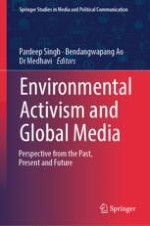2024 | OriginalPaper | Buchkapitel
5. Role of Global Media and Social Media in Raising Environmental Issues
verfasst von : Asha Sharma, Hardik Giri Gosai, Virender Singh
Erschienen in: Environmental Activism and Global Media
Verlag: Springer Nature Switzerland
Aktivieren Sie unsere intelligente Suche, um passende Fachinhalte oder Patente zu finden.
Wählen Sie Textabschnitte aus um mit Künstlicher Intelligenz passenden Patente zu finden. powered by
Markieren Sie Textabschnitte, um KI-gestützt weitere passende Inhalte zu finden. powered by
